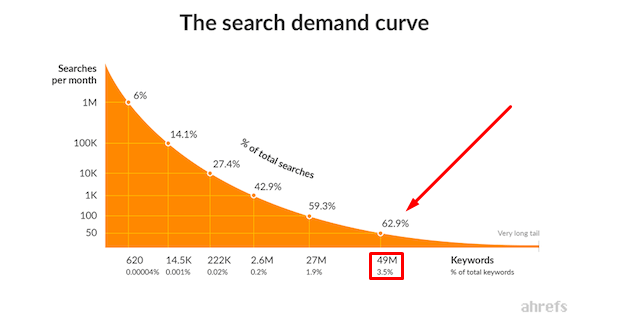
Are you a blogger or a marketer or a SEO? In this blog, I am going to tell you about the ways to come on the front page in google. Above all ‘Google is not a newspaper that knows its audience. For instance, the whole world (two or three countries excluded) uses it for millions of purposes with millions of word combinations. In short, how would you know how to do keyword research for mass users?
Did you ever think that why a particular site is on top of the search result? While there are thousands of search results in milliseconds in Google. Firstly, Google can list the frequency of a particular word or phrase used over a month or a year. Secondly, Google shows the results related to the higher frequency words online.
What is a ‘Keyword’?
By this time, I believe you already know the answer. A keyword is a word people use in search engines to look for answers. The term is also known as ‘SEO keywords’.
There are normally three types of keywords-
- Generic keywords: Shoe, Camera, Ball
- Broad keywords: Nike shoe, canon camera, basketball player
- Long-Tail Keywords: ‘Best Nike Shoe Outlets in New York’, ‘What is the best model of Canon Camera for a beginner?’, ‘The highest paid basketball player’.
Why is Keyword Research Important?
Before going into the guide to keyword research, I want to show you how important keyword research is? When you are writing a blog or working in an online news portal or magazine, you need to pay your audience’s attention. According to ahrefs, more than 90% of web pages don’t get organic traffic from Google.
To sum up, here’s why keyword research is necessary:
Audience Target
For example, you work in a sports magazine, and the soccer world cup is coming up this year. Meanwhile your boss tells you to write a blog about the world cup. Can you guess what is the first word your audience might search online?
The answer is ‘the football world cup.’ So excluding such a valuable word, then no matter how informative the blog is. It is never coming to the front page in the search results.
Satisfying the Audience
People need answers, therefore they search online. However, Google filters the blogs with the most reliable answers with related words. For instance, the soccer world cup is going to be held in Mexico this year. So a prime query of the US soccer lovers is the price of the tickets and the matches’ venues.
A standard blog should have these answers to satisfy the audience. So they get what they are looking for. Certainly, it can increase your traffic.
Reaching Your Goal
You make efforts so that the blogs, news, and magazines come on top. In addition, you will get some subscribers, premium members, or shareable personals. A good blog with authoritative credentials will not help you unless you have keywords.
So giving answers to the ticket prices and venues and times will not work if you use wrong keywords. In the United States, people understand football and soccer as two different sports. You have to be to the point while writing such a blog.
How to Do Keyword Research for SEO?
When you search keywords for SEO (search engine optimization), you must keep in mind about three things. A Pennsylvania State University research team found three types of queries or search intent-
- Navigational (Go): go, look, names, best, worst
- Informational (Know): how what, how many, where
- Transactional (Do): price, how much, cost, offer, less than, A vs. B
Navigational
It is like an inquiry about a website or a particular subject. Suppose your audience already knows the address of information. Maybe the user is unsure about the URL or exact site name. So searching by keywords is his only option to reach that site.
A standard example could be looking for ‘action movie actors IMDb’. So the search results will navigate you to action movie actors in IMDb and their movies.

Or maybe you are interested in the next soccer world cup. So you search with the keywords ‘soccer world cup 2022’, and Google will navigate you to specific search results.
Informational
It is more like knowing things by posing questions. Suppose you want to know ‘who is an action movie actor now?’. This search will lead you to several trending action heroes. The informational query can be posed as a question.
So if your blog has keywords that include related questions about a topic, there is a chance that you will find your blog in organic search. Look for the image down below.

There you see some organic results related to the query ‘how to become a martial artist.’ It does not give you a specific answer to your question. But it gives a pool of information to know.
Another example could be ‘how to do keyword research for amazon affiliate marketing?’ where you see many affiliate marketing techniques, but you have to choose your site for that.
Transactional
Another search intent people look online is Transaction. You possibly are a blogger. So paid SEO tools are a must for your blogs. You may search for ‘best SEO tools under $200’ and get these results-
Did you notice the Informational intents in the box? This is a feedback result for your search intent.
Another Example of transactional intent could be the Samsung Galaxy S series Vs. iPhone X.
These are the techniques to look for keywords. Thus your SEO rank will improve.
How to Do Keyword Research
Search Engine experts explain that to do keyword research, and you have to follow some steps. In this way, you might need some software help also. Here are eight steps, how to do keyword research-
1. List Your Products and Subjects
When you are writing blogs or articles on your site, you want to highlight your products or subjects that you want the audience to know. If you work as a new blogger, here are some keywords to start your blog-
Keyword (60,500)
SEO (135,000)
Niche words (110)
Marketing (110,000)
E commerce (40,500)
Blog (246,000)
Numbers are the search volume of the keywords of this blog in the USA. If people search for related topics or keywords, there is a chance to make the top ten. But among them, you see the words ‘SEO,’ and ‘Marketing’ have been searched more than the others.
So writing a blog containing these keywords is fruitful for you. But that is not all. Go to the next step to see how it works.
2. Fill those Topics with Long-Tail Keywords
This step should sound like common sense. Millions of people search for single words for different reasons. Short tail keywords usually are one or two words; for example, ‘Affiliate Marketing.’ This is a broad and generic keyword, ambiguous, with a high search volume. If you add long-tail keywords, chances for your blog to show up increases. Long-tail keywords are particular and target audience. The answers of long-tail keywords produce a healthy conversation between the blogger and the visitor. Let’s have a look at this analysis result of Ahrefs.

This clearly shows that writing with specific long-tail keywords is more effective. This can draw more target audiences than short keywords.For instance, the mentioned keywords in section 1 can be written explicitly like this-
How to do keyword research for e-commerce?
How to do keyword research for niche sites?
How to do keyword research for amazon affiliate marketing?
How to do keyword research for blog posts?
And many more like this.
Look at my Title. It is also a long-tail keyword! Did you search for this title?
3. Learn How Search Intent Affects Results
You already know about search intents. Now let’s talk about how they affect your audience traffic. Say, for example, If you write this blog with the title ‘How to write a blog like a pro: A Beginner’s Guide.’ This small change can affect your target audience.
Several questions come up with your title selection-
-Are you writing only for bloggers? Or,
-Are you writing for the whole blog site community? Which may include back end developers, keyword researchers, video makers, etc.
So using a specific keyword is for search intent. You can talk to your sales team for a clue if you are new to this.
4. Research The Suggested Search Items
You may have thought about it sometimes. When you search for any topic in Google or anywhere, there are some suggestions below the results. So they are related to your search intent. You can get ideas from those keywords also. Look at this picture to get some conceptions-
These related suggestions can also help you select your preferred keywords.
5. Research The Use Keyword Research Tools
Keyword research tools can help you generate desired long-tail keywords. SEO tools like Ahrefs, SEMrush, and Ubersuggest can suggest keywords and phrases to very exact audiences and good search ranking. This exercise is time-saving and less brainstorming, of course. But it needs a bit of experience and the idea to research keywords in software.
Plus, this software is not free (although they will let you try a couple of times as a trial). So you need basic training to gain the confidence and idea of keyword research. Without any training, purchasing a premium software might cost you more than you are thinking.
6. How to Do Google Ads Keyword Research
An excellent way to come to the search ranking is by analyzing keywords for a specific region. Google ads have a dedicated site for analyzing keywords named ‘Keyword Planner.’ You can open an account very quickly with a simple trick.
Don’t click on any of the three options when the account seeks one. Instead, choose the ‘switch to expert mode’ down below.
After some basic queries, your account is ready to use.
Now go to Keyword Planner ( you will see the button in the display) and search for a keyword.
I searched for ‘marketing’ in the United States Region and got these results.
You can also see the traffic volume in this particular region in numbers to make your plan.
The box part is an automatic suggestion from google for getting clicks. The arrow is indicating numbers of clicks by searchers for your keyword.
7. Analyze the Trend by Using Google Trends
Google Trends is a good platform if you are thinking about how to do keyword research. You can get the idea of a trending phrase or keyword by using google trends. The account creation is as simple as possible. The most experienced ones get the best out of this tool.
Suppose you are writing a blog that includes both the words ‘keyword research’ and ‘SEO.’ Which keyword should get a priority? Just put your keyword in the search box. You will get a display like a figure below.
You can see that during the lock-down in the US, the search interest grew high. A possible reason could be the humongous use of the internet by people in lock-down.
Now let’s compare this word with ‘SEO’.
What! It clearly outlines the difference. How many people drew their attention to SEO rather than keyword research (although both works simultaneously).
A possible reason could be the rise in blog writing more than ever in the internet world. So everybody looked for SEO (search engine optimization) for better ranking. Are you convinced to do this keyword research course now?
8. Analyze Online Competitors
Suppose you are in affiliate marketing, you have to keep an eye on the competitors. Online competition has become so severe these days; bloggers even search for the word itself. Look down here for a moment.
You must have got an idea of what it means to analyze your competitors’ keywords. If you do not research similar articles or products of competitors, you will get traffic.
But not from targeted audiences.
Closing Note
Keyword Research is an inevitable part of blog writing. If you don’t know how to do keyword research, then stop writing blogs. Firstly you need to know how Google ranks blogs. How essential keywords are for blogs to rank. Do not let go of your hard work in the trash of the internet. Give time in keyword research (SEO also) and rank your blog in the top ten results.





0 responses on "How to do Keyword Research Like a Pro: A Beginner's Guide"